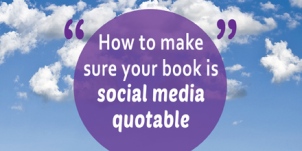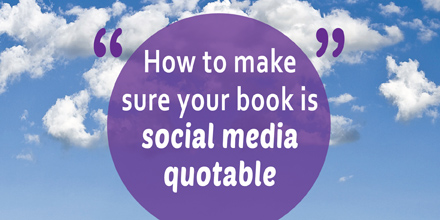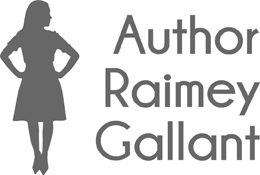
From a marketing standpoint, we authors want to see our books mentioned and photographed by as many readers as possible, as many times as possible, across social media and the blogosphere. I, personally, am more likely to post about a book more often, if that book has one or more quotable passages. And by quotable passages, I mean passages that:
A) are funny, insightful and/or beautifully written
B) aren’t cluttered with story-specific details that could easily be moved to a different sentence
C) can stand alone without much additional context
D) fit the character counts of the social media sites I post bookish stuff to (or, for image-centric sites like Instagram/Bookstagram, where people often add text to images, fit the space within an image with a font size that is large enough to be legible) and,
E) optionally, are timely or literary
EXAMPLE 1: Notice how this quote from Pride and Prejudice fits criteria A through D: “It is a truth universally acknowledged, that a single man in possession of a good fortune, must be in want of a wife.”
If Jane Austen had instead written, “It is a truth universally acknowledged, that a single man in possession of a good fortune, must be in want of a wife, and Mrs. Bennet was going to make sure Mr. Bennet found five such single men, for each of their five single daughters, if it was the last thing she did,” the passage would have been cluttered with story-specific details (B) that add to the length of the quote, making it less easy to post around social media (D). A saving grace is that at least the story-specific details happen at the end of the sentence, and they can fairly easily be curtailed with an ellipsis. Ellipses mid-quote, for me at least, are more of a distraction.
EXAMPLE 2: Take this post of mine about Bird by Bird, a book on the craft of writing. Anne Lamott, way back in 2003, couldn’t possibly have known that I would try to squeeze the anecdote that inspired the title for her book into a 451-character Litsy post. Notice how, in order to fit the quote within the allowable character-count (D), I had to repeatedly trim words with the use of ellipses. I also had to squeeze in some context at the beginning, so my followers would better understand why I was posting the quote (C).

EXAMPLE 3: Notice how, for this quote I posted from The Bell Jar, which fits the criteria for A, B, and D, I had to add a fair amount of context before sharing the quote (C). I’m not saying Sylvia Plath should have written it differently, just that because so much context is needed, this particular quote wouldn’t work as well as a text-overlayed-on-image type post that you might, for instance, come across on Instagram/Bookstagram.

EXAMPLE 4: As to the optional criteria for E, timely or literary, by timely I mean something that the author might not be able to predict when writing but that fits with the news cycle at the time a reader is reading the book. And by literary, I mean anything that references books. From what I’ve noticed, the literary community likes to share bookish quotes (relating to a character’s favorite reading nook, bookshelves, book buying habits, libraries or librarians, etc.), I think, because it feels like an inside joke with the author. This won’t work in every book, and not all characters are going to be readers, but if it does fit one of your characters, consider this food for thought. Here’s an example of a timely quote from The Left Hand of Darkness by Ursula K. Le Guin.

 Now, I’m not saying authors should contrive quotes at the expense of their story. All I’m saying is that once in a while, if you have an aha moment after you’ve written a really dope sentence (or two,) read it again but with your marketer’s hat on to see if it fits criteria A through D (and optionally E), and if it doesn’t, consider rewriting it so it does. If you have three to five such moments while writing your book, that’s three to five quotable passages, three-five additional opportunities for readers to post about your book, three to five additional opportunities for potential readers to find out more about you and your book.
Now, I’m not saying authors should contrive quotes at the expense of their story. All I’m saying is that once in a while, if you have an aha moment after you’ve written a really dope sentence (or two,) read it again but with your marketer’s hat on to see if it fits criteria A through D (and optionally E), and if it doesn’t, consider rewriting it so it does. If you have three to five such moments while writing your book, that’s three to five quotable passages, three-five additional opportunities for readers to post about your book, three to five additional opportunities for potential readers to find out more about you and your book.
This post is part of the #AuthorToolboxBlogHop. So many great blogs to keep hopping through. Click here to join the hop and to see what other writing tips you can glean from this month’s edition.
Where do you post about other authors’ books (blog, Twitter, Goodreads, Litsy, etc.)? Do you ever post book quotes on your blog or around social media? Is writing quotable passages a goal of yours?


Good tip Raimey
LikeLiked by 1 person
Why thank you! I’m going to send you an email later today with a status update on that blog post I promised you. 🙂
LikeLike
I love that you talked about this! It’s funny how you don’t think about these marketing activities until you’re in the position to share your work and you can’t find a single shareable passage. This process is definitely now being incorporated into my revision stage.
LikeLiked by 1 person
I totally agree. I remember a few years back, after I’d finished my first book, I was entering a writing competition, and I had a heck of a time finding “my favorite quote” from the book.
LikeLike
Interesting observations. I have only recently began to appreciate the value of the timeless ideas in my writing. I appreciate these gems of wisdom when I’m reading. They always make me value the book more.
LikeLiked by 1 person
They’re like brain candy! 🙂
LikeLike
Very comprehensive list of tips, thank you Raimey.
LikeLiked by 1 person
Why thank you. 🙂 I’ll visit back soon. 🙂
LikeLiked by 1 person
A great list of tips and advice, thank you!
LikeLiked by 1 person
Thanks for stopping by Nasreen! I’ll come pop by to see what you’ve been up to (soon!)
LikeLike
Thanks for the article. When I’m self-editing, I always highlight those passages which would work well for teasers or social media quotes. I find if I give these quotes to bloggers promoting my book, they are happy to use them.
LikeLiked by 1 person
That is fabulous advice!
LikeLiked by 1 person
I’m in the middle of a huge marketing project for university and these are great tips, thanks 🙂
I use Twitter, Instagram, my blog, and Goodreads, although I’ve not had time for more than the blog lately! What’s Litsy like?
LikeLiked by 1 person
It’s like if Facebook and Goodreads had a baby. It’s quite interactive. Read this: https://raimeygallant.com/2017/10/31/litsytips/
LikeLiked by 1 person
Sounds interesting, I’ll check it out 🙂
LikeLike
The Facebook + Goodreads baby comment made me smile… and now I’m curious about the platform. 🙂
LikeLike
Yes! This is great advice. I like to pull out and share quotes on my blog or social media accounts as I go through my second draft to try to generate interest.
LikeLiked by 1 person
That’s smart. I’ll have to do that one of these days. 🙂
LikeLiked by 1 person
Excellent. I haven’t thought about this (much) before, but I can see the value of it now 🙂
Ronel visiting on Author Toolbox day: The One…
LikeLiked by 1 person
I think a lot of us authors probably do think about quotable passages. I had to really put some thought into it in order to write this post, though.
LikeLiked by 1 person
I need to be more involved in this and I’m going to have to. it’s as simple as that. You created such amazing detail in this post. I may have to hire you as my social media coach.
LikeLiked by 1 person
*blushes*
LikeLiked by 1 person
Good tip! It’s always so hard to go back and pull the quotes after the fact for marketing teasers. Trying to keep record of stand out sentences during the process would make it a little easier. Especially for folks like me with terrible memories having to hunt and find later.
LikeLiked by 1 person
Highlighting might be an idea…I’ll have to think about it.
LikeLike
Great Idea. May I also suggest that beta readers could point out their favorite quotes to help build the list if the writer was having trouble selecting them. 🙂
Anna from elements of emaginette
LikeLiked by 1 person
Love it!
LikeLiked by 1 person
I’m still learning how to leverage social media. Your suggestions are helpful. I’m going to find some quotable quotes from my latest novel right now!
LikeLiked by 1 person
Yea! Happy hunting! 🙂
LikeLike
Thank you for these sound tips – now for finding these quotes …
LikeLiked by 1 person
I remember last year (or maybe a couple years ago?), there was a competition to pull a quote from your work-in-progress, and I had such a hard time finding one. It made me look at passages that were nearly there and tighten them, so it was a worthwhile exercise.
LikeLiked by 1 person
This is great advice! I’ll be sure to keep all of this in mind; I’m still learning how to use social media well!
LikeLiked by 1 person
Me too! It’s an ongoing struggle. 🙂
LikeLike
Always good to keep the marketing in mind as you go. Definitely not to write the book only for marketing purposes, just like you said. But when I’m editing I do highlight or keep different bits that I think might make a good quote. In general my tagline/loglines end up making fantastic quotables, they’re designed to be that anyway.
LikeLiked by 1 person
I was just thinking about highlighting passages. Thanks for the tip!
LikeLiked by 1 person
Now you’ve given me something to think about. I’ve never tried to promote using a clever quote from my own writing. Hmmmm
LikeLiked by 1 person
I’m sure you’ll find lots of gold to work with. 🙂
LikeLike
I would say, taste aside, that we ALL should cherish Lanham’s Revising Prose.;
LikeLiked by 1 person
Checking it out now!
LikeLike
I offer that so we might be able to trim the fluff and make more of what we write quotable, as you suggest.
LikeLiked by 1 person
Very interesting post, Raimey.
I like the sound of E – well, I think my writing leans towards the literary.
Thanks for sharing.
LikeLiked by 1 person
My pleasure!
LikeLike
Food for thought here, Raimey. Thank you.
LikeLiked by 1 person
My pleasure. 🙂
LikeLiked by 1 person
I love how you’ve broken it down for us. Too many story specific detailsdont make for great writing – I think. Therefore no great quotes either. I’ll scan my writing now to check for quotes and marketability.
LikeLiked by 1 person
I’m sure you’ll find lots to work with. 🙂
LikeLike
Another excellent and informative post, Raimey. Such food for thought. Thank you so much. I try to post about books regularly on Goodreads and twitter. Enjoy your weekend.
LikeLiked by 1 person
Makes complete sense. Thank you!
LikeLiked by 1 person
Thanks for stopping by, Ankur!
LikeLike
I’ll have to keep this in mind next time I write.
LikeLiked by 1 person
Thanks for stopping by, Kevin!
LikeLiked by 1 person
My pleasure. 🙂
LikeLiked by 1 person
Excellent post, Raimey! 🙂 Great examples and lots of food for a writer’s thoughts. Thanks for sharing.
LikeLiked by 1 person
Thank you so much for stopping by!
LikeLiked by 1 person
My pleasure, Rainey! 🙂
LikeLike